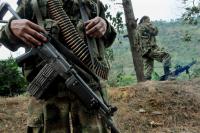-
Sizable increase in U.S. R&D spending
U.S. research and development (R&D) performance rose to $477.7 billion in 2014 — an increase of $21.1 billion over the previous year — and is estimated to hit $499.3 billion in 2015. adjusted for inflation, growth in U.S. total R&D performance averaged 1.2 percent annually between 2008 and 2014, matching the average pace of U.S. gross domestic product (GDP).
-
-
Somalia: Al Shabaab weakened but not defeated
Efforts to weaken the al Qaeda-linked terrorist group al Shabaab in Somalia have had some success over the past five years, but the U.S. campaign there is now in jeopardy, according to a new study. Al Shabaab may resurge if urgent steps are not taken to address the political, economic, and governance challenges at the heart of the conflict, researchers say.
-
-
Disaster communications: Lessons from 9/11
What we and the other responders learned on 9/11, under the pressure of a disaster of incredible scale, scope and urgency – not to mention the international media spotlight – went on to spark major changes in U.S. emergency response communication. By ensuring that – no matter what happens – we can communicate with each other, the emergency response community keeps the memory of 9/11 alive in our own way every single day.
-
-
Terrorist attacks are more likely to succeed if there are more plot participants
An examination of the relationship between success of terrorist plots and the number of participants and preparatory acts, and the length of the planning process, shows that the more people involved in planning a terrorist attack in the United States, the more likely it is to be successful. The greater the number of preparatory acts required, however, the greater the probability for failure.
-
-
Linking terrorism with mental illness reinforces stigma, impedes prevention efforts
An “automatic assumption” to link terrorist acts with mental illness unfairly stigmatizes the millions of people with mental health problems and impedes prevention efforts, psychiatry experts warn. They explain that terrorist groups and networks seem to avoid recruiting people with mental health problems, “probably because they share some of the same stigmatized views as the rest of society and see people with mental health conditions as unreliable, difficult to train, and a security threat.”
-
-
Case study offers insights for more effective countering violent extremism (CVE) campaigns
New research offers insights into the psychological motives and mechanisms that radicalize a person to commit violence. The new study takes a detailed look at Momin Khawaja, a convicted terrorist who was arrested in 2004 in connection to a U.K. bomb plot, and offers some possible implications for countering violent extremism (CVE). The researchers argue that in addition to fitting a “caring-compelled” profile of lone-actor terrorists, Khawaja is an early example of a Western foreign fighter.
-
-
U.S. destroys large ISIS chemical weapons manufacturing facility
The U.S. on Monday destroyed an ISIS chemical manufacturing facility in Iraq, which posed a “significant chemical [weapons] threat.” Footage of Monday air strikes showed twelve aircraft hitting a sprawling industrial site in Mosul. The hits were followed by huge explosions in multiple buildings and storage facilities. The buildings were quickly engulfed by flames, and heavy plumes of dark smoke rose into the air. USAF spokesman said that fifty individual targets were hit in the attack.
-
-
U.S. spending on war on terror since 9/11 to reach $4.79 trillion in 2017

In 2002, Lawrence Lindsey, George W. Bush’s chief economic adviser, estimated that the cost of waging war in Iraq would not exceed $200 billion. As the fifteenth anniversary of the 9/11 attacks approach, the United States has spent or taken on obligations to spend more than $3.6 trillion in current dollars on the wars in Iraq, Afghanistan, Pakistan, and Syria and on the Department of Homeland Security. The total expenditure for the wars in the Middle East and the war on terror rises to $4.79 trillion when dedicated war spending for the coming fiscal year is added in, along with the nearly $32 billion requested for the Department of Homeland Security for 2017.
-
-
Command under attack: What we’ve learned since 9/11 about managing crises
Major disasters pose difficult challenges for responders on the ground and for higher-level officials trying to direct operations. Some events are novel because of their scale, while others involve challenges that no one may ever have envisioned. Communities need to bring their response agencies together regularly to plan and practice. This can develop and maintain knowledge and relationships that will enable them to work together effectively under the high stress of a future attack or disaster. Any community can do this, but many have not. Where training and practice have taken place, these tools have worked. They can be improved, but the most important priority is getting more communities to practice using them more regularly, before the next disaster. One important way this nation can honor the victims of 9/11 is by using these lessons to create the conditions for even better coordination in future events.
-
-
ISIS instructs soccer referees in Syria to enforce Sharia laws, not FIFA rules
ISIS has outlawed soccer referees in its Syrian strongholds because they implement the rule set by FIFA (the world governing soccer federation) “in violation of the commands of Allah.” Local ISIS commanders had drawn up a list of Sharia-inspired soccer rules detailing, for example, how players who were injured during a game can be compensated by their opponents.
-
-
U.S., Israel sign record 10-Year, $38 billion defense package
After nearly a year of negotiations, Israel and the United States have signed a record $38 billion, 10-year military aid package. The deal is “the single largest military assistance package — with any country — in American history,” American ambassador to Israel Dan Shapiro said
-
-
15,000 French citizens are in the process of being radicalized: French PM
France’s prime minister Manuel Valls warned on Sunday that some 15,000 French citizens could be in the process of being radicalized. His warning came a day after the police arrested a 15-year-old boy at his Paris home in order to thwart a planned weekend terrorist attack.
-
-
Hundreds of children under 10 in the U.K. were “at risk of extremism” last year
In just one year, the U.K. government’s Channel de-radicalization program has received reports of more than 350 children under the age of 10 who were “at risk of extremism.” The Channel program earmarks such youngsters for mentoring by program’s specialists. In total, 4,611 people were referred to the program between June 2015 and June 2016 — a 75 percent increase compared with the previous year, when there were 2,632 referrals.
-
-
FARC rebels apologize for kidnapping 27,000 Colombians

In a video recording released late Sunday, Colombia’s Marxist FARC rebels have apologized for the “great pain” they caused by kidnapping thousands of people and holding them for ransom to fund their 52-year war against successive Colombian governments. Official figures show that some 27,000 people were kidnapped between 1970 and 2010. In addition to kidnapping, the FARC used extortion and the drug trade to finance its campaign. On 24 August the leadership of the FARC igned a formal agreement with the Colombian government to put an end to South America’s longest war.
-
-
Fitness trackers found to have serious security flaws

They may look like a normal watch but are capable to do much more than just showing the time: So-called fitness trackers are collecting data on their users’ lifestyle and health status on a large scale helping them with training or losing weight. Researchers have investigated fraud opportunities with fitness trackers and detected serious security flaws.
-
More headlines
The long view
Kinetic Operations Bring Authoritarian Violence to Democratic Streets
Foreign interference in democracies has a multifaceted toolkit. In addition to information manipulation, the tactical tools authoritarian actors use to undermine democracy include cyber operations, economic coercion, malign finance, and civil society subversion.
Patriots’ Day: How Far-Right Groups Hijack History and Patriotic Symbols to Advance Their Cause, According to an Expert on Extremism
Extremist groups have attempted to change the meaning of freedom and liberty embedded in Patriots’ Day — a commemoration of the battles of Lexington and Concord – to serve their far-right rhetoric, recruitment, and radicalization. Understanding how patriotic symbols can be exploited offers important insights into how historical narratives may be manipulated, potentially leading to harmful consequences in American society.
Trump Aims to Shut Down State Climate Policies
President Donald Trump has launched an all-out legal attack on states’ authority to set climate change policy. Climate-focused state leaders say his administration has no legal basis to unravel their efforts.
Vaccine Integrity Project Says New FDA Rules on COVID-19 Vaccines Show Lack of Consensus, Clarity
Sidestepping both the FDA’s own Vaccines and Related Biological Products Advisory Committee and the CDC’s Advisory Committee on Immunization Practices (ACIP), two Trump-appointed FDA leaders penned an opinion piece in the New England Journal of Medicine to announce new, more restrictive, COVID-19 vaccine recommendations. Critics say that not seeking broad input into the new policy, which would help FDA to understand its implications, feasibility, and the potential for unintended consequences, amounts to policy by proclamation.
